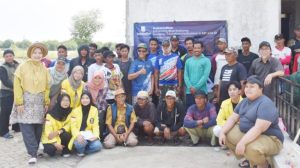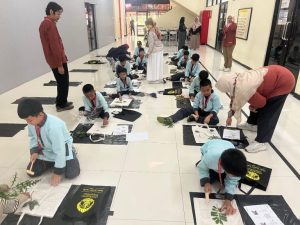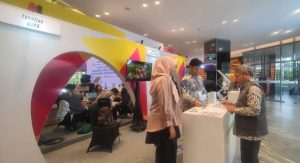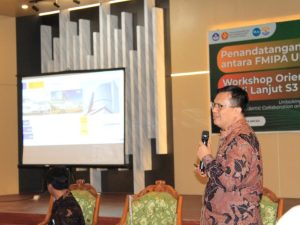|
FMIPA UI Through the Sustainablue Team, Holds a Workshop Highlighting Microplastics and Severe Abrasion Issues

The SustainaBlue Team from the Faculty of Mathematics and Natural Sciences, Universitas Indonesia (FMIPA UI), held a Blue Economy Workshop in Pantai Bahagia Village, Muara Gembong District, Bekasi, on Sunday (November 3). The event, attended by 52 fishermen, aimed to improve coastal welfare through the implementation of a blue economy and to provide education on the dangers of microplastics.
Pantai Bahagia Village, where the activity was held, is a coastal area highly dependent on the fisheries sector. Around 80 percent of its residents work as fishermen, fish farmers, or seafood business operators. However, the area is also facing significant ecological pressures. According to a 2022 study by BRIN, waters from nine river estuaries flowing into Jakarta Bay contain an average of 9.02 microplastic particles per 1,000 liters of water. Meanwhile, abrasion continues to erode the coastline; mangrove forests in Muara Gembong have been shrinking by about 255 hectares per year, leaving only 379 hectares remaining in 2019. Between 2012 and 2020, an estimated 80 percent of the coastal area was reported lost, and more than 100 families lost their homes.
“We want to promote innovation in coastal management while also protecting ecosystems such as mangroves, whose role is crucial in preventing abrasion. Muara Gembong is a real example of how pressure on coastal areas directly affects the lives of local communities,” said Dr. Retno Lestari, Deputy Coordinator of SustainaBlue UI.
“Therefore, we not only present the concept of the blue economy, but also ensure that this program is relevant to the conditions of local fishermen and small businesses here so that their welfare can truly improve,” she said.
Dr. Retno explained that SustainaBlue is a collaborative cross-country initiative involving universities from Indonesia, Malaysia, and Greece. The participating institutions include Universitas Indonesia (UI), Institut Teknologi Sepuluh Nopember (ITS), Universiti Sains Malaysia (USM), Universiti Malaysia Terengganu (UMT), the University of Cyprus (UCY), and the University of the Aegean (UoA).
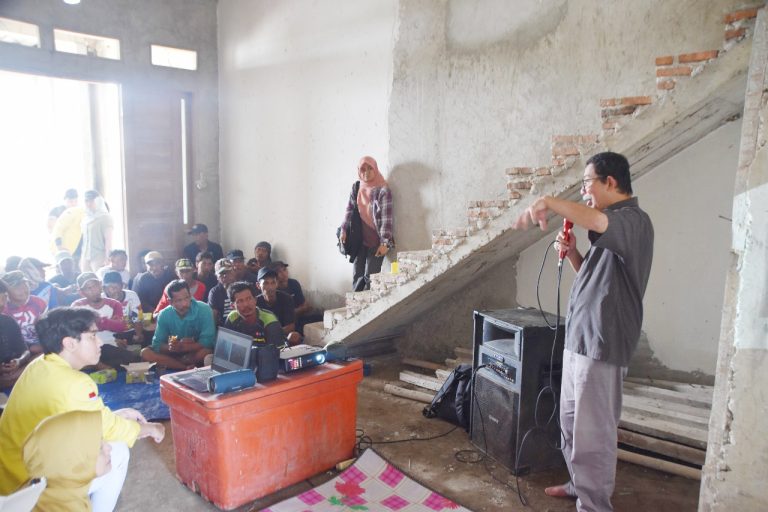
The SustainaBlue program aligns with government agendas, including the National Strategic Program on sustainable aquaculture revitalization and mangrove restoration. This activity also underscores the urgency of policies to reduce plastic waste, especially ahead of the closure of 343 open-dumping landfills in 2025, which will require more modern and proper waste management starting from the household level.
In the presentation session, Prof. Dr. rer. nat. Mufti Petala Patria, M.Sc., presented the findings of his research on marine microplastics through photographs and field data. He emphasized that the threat has already reached a serious stage.
“These microplastics come from decomposed plastic waste and have now entered the food chain,” said Prof. Mufti.
“The impacts on humans are no small matter: they can trigger infertility, obesity, and even cancer. Therefore, fishermen must be more careful when discarding nets or fishing lines so as not to worsen the pollution,” he said, emphasizing the serious dangers posed by microplastics.
The presentation received serious attention from village officials. Ahmad Qurtubi, Secretary of Pantai Bahagia Village, considered Prof. Mufti’s explanation an important warning for the community.
“That explanation opened our eyes to the fact that waste pollution, especially microplastics, has become extremely dangerous and threatens our health without us realizing it,” said Ahmad Qurtubi.

In addition to education, the workshop resulted in several follow-up programs. The SustainaBlue Team will provide assistance in managing fishery products, including shrimp paste, salted fish, fish meal, as well as fresh shrimp and crabs. The team will also support fishermen in improving distribution routes so that their products can reach Jakarta with better quality. These efforts will be expanded through collaboration with the sub-district government to reach other villages in Muara Gembong.
Local fishermen welcomed the presence of the FMIPA UI Team. “Thank you to FMIPA UI, the lecturers and students who came here. We hope programs like this can continue so that the income and economic conditions of fishermen can improve,” said Ja’far, one of the fishermen participating in the workshop.
After the presentation session, the FMIPA UI team visited shrimp ponds and the sites for shrimp paste and fish meal processing to directly observe the condition of local fishery businesses. The visit was part of UI’s effort to ensure that the assistance provided aligns with the community’s needs.
Share this:
Other News

